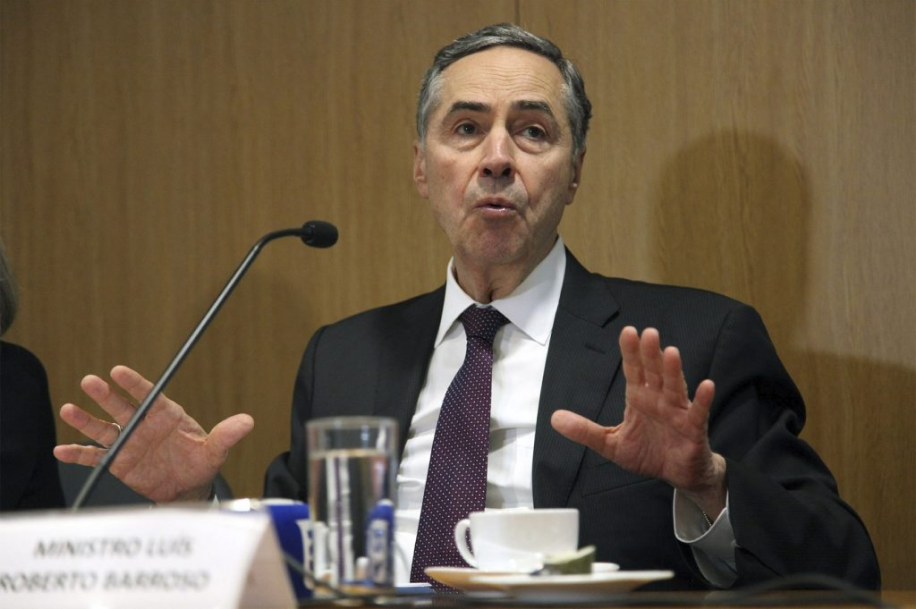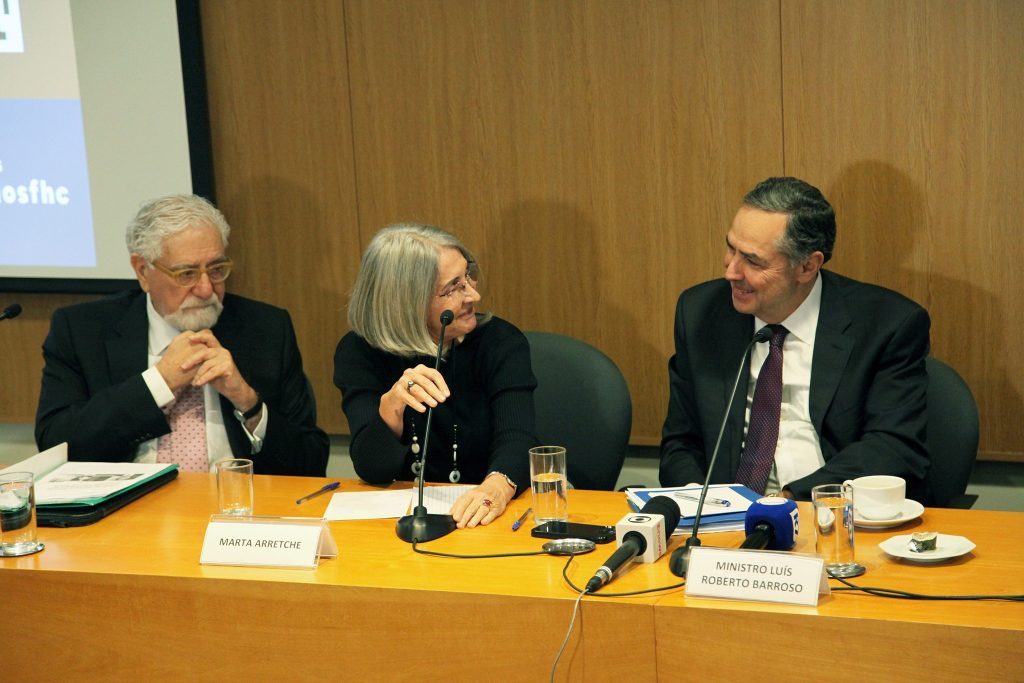Justices Barroso and Jobim Debate the Role of the Supreme Court
What lessons have been learned from the stress test that Brazilian democracy has faced in recent years? After a period of intense and necessary protagonism, how should the Supreme Court position itself in the years ahead?
The increasing prominence of Brazil’s Federal Supreme Court in politics and society was the focus of an in-depth—and rare—debate between the current Chief Justice, Luís Roberto Barroso, and Nelson Jobim, who led the Court from 2004 to 2006. The event took place at the Fundação Fernando Henrique Cardoso auditorium in São Paulo on April 22. Also, it featured constitutional expert Oscar Vilhena Vieira and political scientists Marta Arretche and Sergio Fausto.
In his opening speech, which lasted around 30 minutes, Chief Justice Barroso explained that the Court’s judicial prominence in Brazil resulted from a comprehensive Constitution and a constitutional framework that allows easy access to the country’s highest court for various actors within Brazilian society.

Photo: Vinicius Doti
“This was a choice made by the constituent assembly members who drafted the 1988 Constitution. The current Constitution addresses matters that, in most countries, are left to politics to resolve. It is the responsibility of the Federal Supreme Court to be the guardian of our comprehensive Constitution. In fulfilling this role, the Court will inevitably displease many. Public opinion polls cannot ensure the Court’s prestige. You can’t please everyone.”
Chief Justice Luís Roberto Barroso
The Chief Justice defended the Court’s actions in the face of threats to democracy and the rule of law during the Bolsonaro administration (2019–2022), which culminated in the attacks on the headquarters of the three branches of the federal government on January 8, 2023.
“We faced the shadows, and we ran the risk that they would prevail. In a very complicated situation, the Federal Supreme Court had to take the lead in this battle against extremism. The highest court is subject to criticism, like any institution, but it does not bow to the destructive forces threatening democratic institutions. Democracy has room for liberals, progressives, and conservatives, but it has no place for intolerance,” stated Justice Barroso.
At the conclusion of his presentation, Chief Justice Barroso reminded the audience that “Brazilian society is highly polarized, radicalized, and intolerant” and proposed a “minimum constitutional agenda” aimed at uniting people around the fundamental rights outlined in the Constitution.” His proposed priorities include combating poverty and social inequality, promoting economic growth and increased productivity, valuing private initiative, prioritizing basic education, investing in science and technology, enhancing public security, expanding basic sanitation, providing affordable housing, and protecting the environment.
In a very complicated situation, the Federal Supreme Court had to take the lead in this battle against extremism.
Luís Roberto Barroso, Chief Justice of Brazil’s Federal Supreme Court
Supreme court must be more cautious and exercise self-restraint, says former Chief Justice Jobim
During the audience Q&A portion of the debate, former Chief Justice Nelson Jobim—who also served as Minister of Justice (1995–97) and Minister of Defense (2007–11)—requested to speak:
“Everyone agrees with the agenda that Justice Barroso is proposing. The problem is not what, but how. That’s where the disagreements begin.”
“Brazilian politics has lost its ability to resolve conflicts. As a result, it started turning to the Federal Supreme Court to mediate political disputes. Today, everyone knows who the Supreme Court justices are, but no one knows the party leaders in the National Congress, who, in the past, were responsible for building legislative majorities to pass key projects for the country,” said Mr. Jobim, who was a federal deputy from 1987 to 1995 and played a critical role in the Brazilian Constituent Assembly (1988–89).
“When the Supreme Court is called upon to arbitrate issues that politicians should resolve, it undermines the role of politics. Former Justice Teori Zavascki (who tragically died in a plane crash in 2016) mentioned this in a ruling where he opposed certain decisions that overstepped constitutional principles, venturing into the ‘how.’ How is this done? And when someone is deciding the ‘how,’ those who should be leading—whether in the Legislative or Executive branches—opt not to act to avoid political wear and tear, deferring the matter to the Court,” continued the former minister.
“Hence, there is a need for the Supreme Court to exercise self-restraint. Barroso, I believe there should be consideration within the Court on how to avoid taking definitive action on the ‘how.’ In my opinion, this responsibility falls to the Chief Justice. So, I would like to ask you: Is it possible for the Supreme Court to adopt a more cautious approach today? Can the Court establish a form of progressive restraint in its actions so that political actors are compelled to fulfill their roles?” Mr. Jobim concluded.

Courtroom politics fuels polarization, warns Marta Arretche
“We can’t normalize this discussion because if the defense of democracy becomes a concern for the Supreme Court, it’s already a problem for democracy,” said Ms. Marta Arretche, a full professor in the Department of Political Science at the School of Philosophy, Letters, and Human Sciences at the University of São Paulo (FFLCH-USP). “We must remain vigilant, as the Brazilian far right, like in other countries, has become electorally competitive, meaning the risk of a democratic setback did not disappear with the defeat of Jair Bolsonaro in 2020,” she added.
According to Ms. Arretche, political scientists are “frantically trying to understand what fuels the extreme right. It’s not just a matter of brainwashing people on social media; it’s a deeper and more complex phenomenon.” She outlined three key risks for both the Judiciary Branch and the country.
The first risk, as Justice Barroso and Mr. Jobim explained, is that political actors have abandoned the legislative arena for legal disputes, relying on the judiciary instead. “Do we have a constitutional design problem here?” she asked.
The second risk is that when the far right brings issues to the Judiciary Branch, they often anticipate legal defeats but still benefit politically: “When the Federal Supreme Court fulfills its role of arbitrating disputes, it inadvertently provides fuel to the far-right political field,” Ms. Arretche explained.
The third risk she highlighted is that when Supreme Court justices make decisions individually or exercise veto power through review requests, it reinforces the far right’s narrative that the court acts arbitrarily. “This narrative has already found resonance among a significant portion of Brazilian society, and it could lead to more serious problems in the future,” she warned.
“We need to better understand the sources of the far right’s electoral success to provide the right responses,” Ms. Arretche concluded.
How does the Supreme Court plan to strengthen its judicial authority? asks Vilhena
“Everything from a pin to a rocket eventually ends up at the Supreme Court. No moral, economic, or political issue bypasses it,” quipped Oscar Vilhena, professor of Constitutional Law and director of the São Paulo School of Law at Fundação Getulio Vargas (FGV Direito SP). According to him, the claim often made by the far right—that the Supreme Court is overstepping its bounds by ruling on matters that should be decided by the Legislative Branch—is false.
“There is no overreaching Supreme Court, but rather a court that has been entrusted with a greater degree of political-institutional authority than its counterparts in other countries, as enshrined in a broader Constitution. Yet, even if unfounded, this narrative of usurpation emerges amidst rising populist movements—not just in Brazil, but in countries like Venezuela, Hungary, Russia, and Turkey, where higher courts have been dismantled for opposing populist governments, whether left or right-leaning. In this dangerous environment, I ask: What is the best defense strategy for the Supreme Court?” Mr. Vilhena remarked.
I can’t imagine any solution other than reinforcing the Court’s authority, based on its judicial institutional authority, which is distinct from the kind of authority exercised by political bodies like the Executive and Legislative Branches. What steps could the Supreme Court take to enhance the consistency of its rulings and strengthen adherence to its ruling history?
Luís Roberto Barroso, Chief Justice of Brazil’s Federal Supreme Court
“The issue of collective decision-making at the Supreme Court, alongside the limitation of monocratic rulings, is one such concern. Additionally, establishing guidelines to standardize certain decision-making processes and applying the theory of deference to political power—in this case, the Legislative Branch and lower courts—are crucial. It’s reassuring when a judicial decision is handled by the Superior Court of Justice, the Regional Labor Courts, or the State Courts. The Supreme Court does not need to be the ultimate decider on everything.”
In his commentary, Mr. Vilhena emphasized that the Supreme Court should exercise greater caution when ruling on decisions that are highly sensitive to the public. “Unlike the Nation’s President, who is accountable for successes and failures at the ballot box, or the Legislature, which has a broader capacity to engage with and reflect the diversity of Brazilian society, the Supreme Court’s authority rests fundamentally on its impartiality and distance from political parties. The Court wields enormous power without the need to answer to voters. This means that its authority must be exercised with utmost care, in a manner distinct from how other political authorities wield power,” he concluded.
The Supreme Court must focus on what’s essential: defending institutions, says Mr. Fausto
“Excuse me, Chief Justice Barroso, but I’d like to raise a challenge. In what other country would the chief justice of the Supreme Court present an internal work agenda that includes topics like education, sanitation, housing, and private enterprise?” asked Sergio Fausto, political scientist and director of the Fundação FHC.
“I see that the Supreme Court has taken on the role of solving all the country’s problems when it should be concentrating on what is fundamental—defending democratic institutions. Especially in times of democratic crisis, as we’ve recently experienced in Brazil and other countries. The Supreme Court can play a pedagogical role for the political system, sending the message: ‘Don’t come to us for everything; we are not the source of all society’s problems and frustrations.’”
Sergio Fausto, General Director of the Fundação FHC.
As the mediator, Mr. Fausto received several written questions from the audience. “Unfortunately, I don’t have time to address all of them, but the majority express concern that the Supreme Court may be falling into a populist trap. With this excess of visibility and prominence, is the Court making itself more vulnerable?”
My agenda is that of the Constitution, Justice Barroso responds
“My agenda is that of the Constitution. And I do not tell anyone ‘how’ to do things,” replied Chief Justice Barroso. “As a member of the Supreme Court and head of the Judiciary Branch, I only demand compliance with the fundamental rights of Brazilian citizens. This includes, for instance, the urgent need to improve public security, as the violence caused by both common and organized crime is a threat to everyone’s safety, particularly the poorest.”
Chief Justice Barroso rejected the notion that the Court had fallen into a populist trap: “Public visibility and populism are not the same thing. The Supreme Court justices publicly defend their decisions, including through TV Justiça, but that does not mean they vote in a populist way.” He further explained that while the Court is not subject to “electoral accountability,” its members are frequently confronted by the public wherever they go.
Finally, he agreed that the Federal Supreme Court should limit monocratic decisions: “The issue of collective decision-making is crucial. If a case is institutionally important, I do not make monocratic rulings. I make sure it’s brought before the full court for approval.”
Otávio Dias is the content editor at the Fundação FHC. He is a political and international affairs journalist, a former correspondent for Folha de São Paulo in London, and former editor of the estadao.com.br website.
Translation: Todd Harkin, Harkin Translations






























